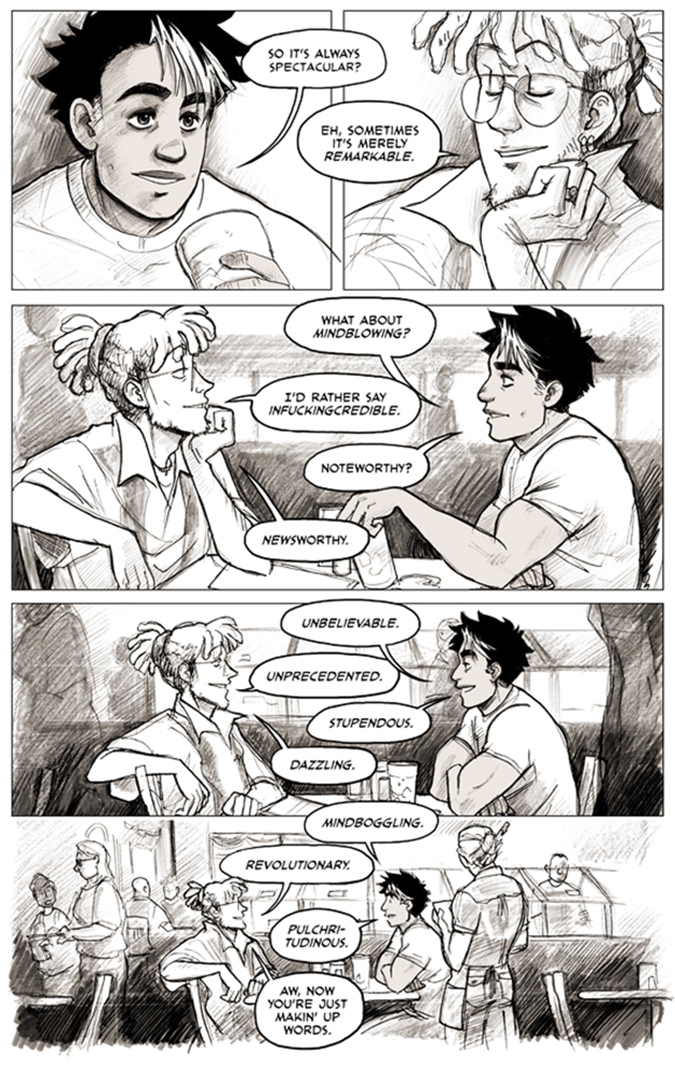- GUTTERFAGS -
Quarterly reviews of sequential art about
dude-on-dude lust and love
-- Back to the front page for more reviews!
Gutterfags is sponsored by Sticky Graphic Novels, an imprint of gay character-based, sex-positive graphic novels published in hardcover by Bruno Gmünder GmbH and in digital format by Class Comics.


The Less Than Epic Adventures of TJ and Amal
by E.K. Weaver
reviewed by Meredith Nudo for Gutterfags
TJ has the money. Amal has the car. They both need an escape from the Bay Area and a hard reset of their difficult lives. TJ’s sloughing off a drug-running career and hopes for a safer future. Amal’s sloughing off expectations that he settle down with a woman, sire a cadre of children, and continue lying about his heterosexuality.
They don’t know each other, but they’re headed to Providence together, anyway. Rhode Island, not heaven, though one would be forgiven for any conflation of the two.
E.K. Weaver’s breezy buddy dramedy webcomic The Less Than Epic Adventures of TJ and Amal, despite the title, tells a big story. A story of compromise. Of acceptance. Of fear. Of companionship, alternately friendly and sexual, but almost always playful. Eventually, they reach their destination, both of them far happier, arguably far healthier, than they were when they first set foot in the car.
The series wraps on Chapter 44, entitled “Grace Under Pressure.” Dreading the inevitable confrontation with his parents, who vocally oppose his homosexuality, Amal Chakravarthy decides to take an unplanned side trip to Graceland Tattoo and Piercing – ostensibly searching for TJ. He grasps a stylized napkin sketch of an anthropomorphic phoenix, a personalized gift from his road trip buddy-turned-lover first appearing in Chapter 19, and enters.
While seemingly straightforward, what makes the ending arresting is how it presents a range of possible conclusions. A more definitive outcome – one where the audience watches them either advance or terminate their burgeoning relationship – would operate against the narrative’s overarching tone of uncertainty. All throughout TJ and Amal, the duo vacillates between succumbing to the allure of spontaneous whims and looking toward the future with anxiety. Amal’s detour to the tattoo shop concludes the comic with a sense of positivity and hopefulness; what happens after he passes through the door, however, remains unspecified.
Given TJ’s drifter circumstances, not to mention his habit of obscuring the truth via omission, it isn’t implausible that Amal doesn’t find him there after all. That his yearning for a new opportunity, a new start, failed to fruit. Rather than a reunion, the phoenix tattoo symbolizes a commemoration of TJ and Amal’s life-altering time together, providing the latter with a sense of closure and imbuing him with the confidence needed to discuss his coming out with his stern, conservative family.
Ultimately, however, what waits inside Graceland Tattoo and Piercing is irrelevant. As a coda, the silent scene represents the moment in Amal’s life where he finally embraces a more balanced approach to life. He no longer frets over accepting and acknowledging his homosexuality, or that his parents might find out. The story itself begins immediately after the latter event, shaping his entire character arc. Agreeing to a cross-country drive with a man whose life seems as loose and unstructured as his seems tightly-arranged – even down to a heterosexual marriage that almost happens – launches Amal toward the necessary equalization.
The time with TJ provides some necessary lessons in how to approach life with a greater degree of flexibility, and to indulge in fleeting flights of fancy every once in a while. To make things interesting instead of waiting for interesting things to happen. Given Amal’s personality and past experiences, though, adopting (or even affecting) an entirely freeform existence mirroring that of his happy-go-lucky companion wouldn’t work.
He also understands the importance of planning ahead. Of setting major goals and working toward them in incremental smaller goals. Medicine truly ignites his passion and his desire to give hope to families who suffer. Having suffered the anxiety and heartbreak of a parent with cancer, abandoning school means abandoning purpose. For Amal, liberation only comes in the areas of his life where liberation had to take place in order to attain greater equilibrium. His arc could not satisfactorily end any other way.
As a symbol, the phoenix tattoo is admittedly obvious. Rebirth, in the context of the comic, comes subtly and spread throughout the course of the comic rather than in a glorious burst of insight. But it comes, and in the form of knowing that there will soon be an end to his anxiety.
Anxiety is all that TJ and Amal share upon their first meeting. They later come to enjoin their stories, and, of course, their bodies, and their time together quells the sharpness of the pain and fear. While both men’s narratives still leave some questions unanswered – most notably the one regarding whether or not Amal’s father will fail to acknowledge him as family – TJ’s finale contains the highest degree of ambiguity.
Implicitly, he started work at Graceland after deliberately disappearing from Amal’s sister Sangeeta’s graduation, an event he attended at his chauffeur-turned-lover’s panicked request. That’s the last the audience sees of him.
Explicitly, where he finally ends up might not be as obvious as it seems. TJ’s life prior to the start of the series consists of staccato vignettes. He meanders from job to job, bed to bed, growing progressively desperate. By the time he meets Amal, TJ resorts to drug running to financially support himself, believing that an apprenticeship at a tattoo and piercing studio stands as one last shot at stability.
Given that instability pockmarks his life, TJ does risk succumbing to old habits. Homeostasis, for him, involves constant questioning – and subsequently fleeing if the answers prove unsatisfactory or, more understandably, dangerous. Graceland may not actually be his graced land, his providence. It may be just another dead-ended disappointment. TJ pushes Amal’s characterization forward more than he does for himself, so it makes sense that his arc concludes first and on a note of attempting to dissolve into a crowd. He exits the comic with the same abruptness as he enters.
None of this means he remains static from the comic’s start to finish. He still undergoes growth and change. Where Amal found inspiration in TJ’s self-assuredness, flexibility, and acceptance, TJ found love and value from a man who asked little and thought big of him. Previous peers shunted him to degrading, dangerous roles as drug mule and coerced sex partner. TJ’s carefree attitude toward life directly feeds off others’ carefree attitude toward him.
The decision to reset by way of a tattoo and piercing apprenticeship at Graceland marks the start of a transition toward something stable, but TJ’s interactions with Amal place him in a more hopeful place than before. If he embraced the new opportunities he crossed the country to attempt, he did so finally understanding what it feels like to be valued by someone he values in kind. He has a frame of reference from which to work on himself and his interactions with others. No matter their future, he can reflect upon his time with Amal as a confirmation of his worth as a person. They nurture one another first as friends, then as sexual (possibly romantic) partners, but never explicitly agree to a serious relationship.
They don’t particularly need one, though. Sex, for TJ and Amal, started as a fun, inexpensive activity to pass the time, but eventually represents their burgeoning feelings of safety and security and gratitude for the others’ company.
In the end, that was all either of them truly needed to refresh and reset their lives. And that was all any readers needed to know to truly understand them as characters.
- About the reviewer -
Meredith Nudo edits and writes for the comics section of Dork Shelf. She has previously published interviews and commentary with Staple! Independent Media Expo, Comics Experience, and in the print and online editions of Space City Nerd. In addition, Meredith edits Speak No Evil from Gray Bear Comics, and has edited comics for writer Hansel Moreno. Her short comic with Musings artist Jessi Jordan, "Psycho Girlfriend," was named one of the top 5 local comics at Comicpalooza by the Houston Press. She holds a bachelor's degree in advertising and graphic design from Sam Houston State University and a master's degree in English from University of St. Thomas. You can find her online at @meredithnudo or hardcorenudoty.com.